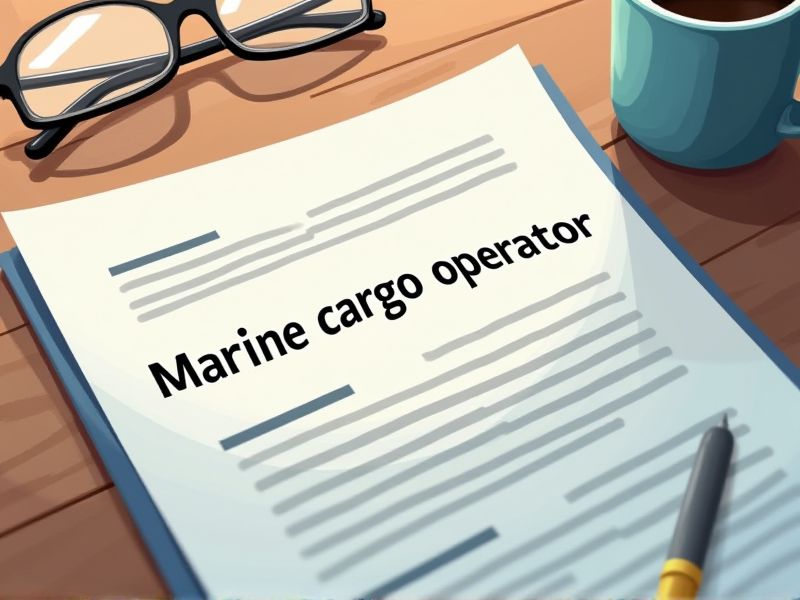
Marine cargo operators play a crucial role in managing the logistics of goods transported via sea, where precision and safety are paramount. Certifications ensure operators are knowledgeable about international regulations, safety standards, and efficient handling procedures. Without proper certifications, operators may face legal penalties and increased risks, potentially disrupting global supply chains. Several important certifications are essential for a marine cargo operator.
International Maritime Dangerous Goods (IMDG) Certification
International Maritime Dangerous Goods (IMDG) Certification is essential for marine cargo operators as it ensures compliance with global safety standards, reducing the risk of incidents during transport. Adhering to the IMDG Code improves the safe handling and stowage of hazardous materials, thereby protecting crew, cargo, and the marine environment. The certification facilitates smooth international shipping operations, as many ports and shipping companies require proof of compliance. Proper training under the IMDG framework enhances operational efficiency and minimizes liability risks associated with accidents or regulatory breaches.
STCW Basic Safety Training
STCW Basic Safety Training is essential for marine cargo operators as it ensures they have the necessary skills to handle emergencies, reducing the risk of accidents at sea. Lack of proper training can lead to mishandling of cargo, potentially resulting in significant financial losses and safety hazards. Compliance with STCW standards is mandated by international regulations, making it a legal requirement for operators to undergo such training. By equipping marine cargo operators with basic safety techniques, the likelihood of workplace injuries and fatalities decreases, fostering a safer maritime environment.
ISPS Code Training
ISPS Code Training enhances security awareness, ensuring marine cargo operators can identify and respond to potential threats effectively. Understanding and implementing international security regulations help maintain compliance, which is crucial for global trade operations. Proper training mitigates risks associated with terrorism and piracy, safeguarding both crew and cargo. Educated operators contribute to safer ports and maritime environments, facilitating smooth and secure commerce.
Marine Cargo Surveyor Certification
A Marine Cargo Surveyor Certification ensures that marine cargo operators have the necessary skills to assess the condition and safety of cargo, minimizing the risk of damage or loss during transportation. This certification demonstrates a standardized level of expertise, which enhances trust among clients and stakeholders in the logistics and maritime industry. With certified surveyors, potential disputes and insurance claims are reduced, as cargo inspections and reports are conducted with recognized competence. Certification also equips operators with knowledge of international regulations and best practices, improving operational efficiency and compliance with industry standards.
Cargo Handling and Stowage Certification
Marine cargo operations involve complex logistics and safety procedures, and certification ensures operators possess the necessary knowledge and skills. Proper cargo handling and stowage certification reduces the risk of accidents and loss, as trained professionals can effectively manage the distribution and securing of cargo loads. Regulatory bodies often require this certification to ensure compliance with international maritime standards. Certified operators contribute to efficient operations, minimizing delays and optimizing vessel capacity utilization.
SOLAS Compliance Training
SOLAS Compliance Training ensures marine cargo operators understand international safety protocols, directly reducing maritime accidents and enhancing crew safety. Without proper training, operators may inadvertently violate standards, leading to potential legal repercussions and financial penalties. Knowledge from this training enhances operational efficiency by aligning procedures with global best practices. Cargo security is strengthened as operators are equipped to manage risks more effectively.
GMDSS Operator Certification
Obtaining a GMDSS Operator Certification ensures that marine cargo operators can effectively communicate during emergencies using global maritime distress protocols. This certification equips them with the necessary skills to send and receive distress alerts, enhancing overall vessel safety. It also ensures compliance with international maritime regulations, avoiding potential legal issues. Proficiency in GMDSS operations can significantly reduce the risk of maritime accidents and cargo losses.
Advanced Firefighting Certificate
Marine cargo operators face increased fire risks due to the presence of combustible materials on vessels. An Advanced Firefighting Certificate equips operators with skills to effectively respond to onboard fires. This certification ensures that operators can conduct fire prevention and suppression with minimal damage to cargo and vessels. Regulatory bodies mandate such certifications to enhance onboard safety and comply with international maritime standards.
First Aid & CPR Certification
Marine cargo operators handle heavy equipment and are often in unpredictable environments, increasing the risk of injury; First Aid & CPR training enables them to manage medical emergencies efficiently. The certification ensures operators can stabilize injured colleagues until professional medical help arrives, minimizing potential long-term harm. In the marine setting, immediate access to medical facilities is limited, making on-site first aid and CPR crucial for survival. Employers in marine industries often require this certification to comply with safety regulations and to enhance workplace safety standards.
Supply Chain Management Certification
A Marine cargo operator faces complex logistics involving international regulations and diverse supply chain networks, making specialized training crucial for efficient management. Supply Chain Management Certification provides the necessary skills to optimize cargo handling processes, reducing delays and operational costs. Certified operators are better equipped to enhance safety and compliance with maritime laws. Gaining certification often leads to improved job prospects and career advancement opportunities in the competitive maritime industry.
Summary
When you, as a Marine cargo operator, obtain certifications, your credibility in the eyes of stakeholders significantly increases. This leads to enhanced trust and more opportunities for business expansion. Certifications demonstrate compliance with international standards, reducing the likelihood of regulatory issues. Increased operational efficiency and safety often accompany these credentials, potentially lowering costs and improving service quality.
